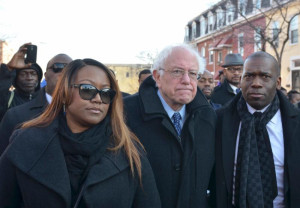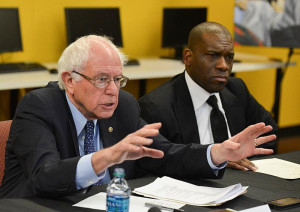
PHOTO: Freddie Allen/AMG/NNPA News Wire
(TriceEdneyWire.com) – Only minutes into Sen. Bernie Sanders’ tour through the impoverished Sandtown community in West Baltimore, he asked a burning question: “What I’m seeing is ‘Checks Cashed'”, he read the sign on a nearby storefront. “Why go in there and cash my check?” asked the Vermont senator, peering at a check cashing store.
His leading tour guide, Pastor Jamal-Harrison Bryant, of Baltimore’s Empowerment Temple, explained:
“You can’t find banks here. They just drop ATMs. So, they take your money, but they’re not looking for you to invest or to save…Our communities are peppered with these check cashing places that we want to see closed.”
As they continued the walk, trailed by dozens of other pastors, community leaders, neighborhood residents and a horde of reporters, Sanders got an earful.
Bryant described the 16,000 abandoned homes in Baltimore neighborhoods, “stores with no fresh vegetables, no produce; literally processed, canned” foods, and the 20 Black-owned businesses with no insurance money to rebuild after being burned out during the April riots. Simultaneously, neighborhood residents called out their need for jobs and activities to keep children off the streets.
“They don’t want us to sell drugs. We need help to get a job!” shouted one woman as other community residents chimed in.
Flanked by Bryant, Pastor Lisa Weah of the New Bethlehem Baptist Church in West Baltimore and Pastor Donte Hickman, whose senior center is being rebuilt after it was destroyed by fire during the April riots, Sanders heard the pain expressed by neighborhood residents and the pastors during the approximately 20-minute walk. But, despite all the voices, the greatest impact was what the senator saw for himself. Glaring at the blight, he appeared confounded.
“One would not know that we’re living in the wealthiest country in the history of the world when what you look at is what a third world country would look like,” he said. “It’s a pretty sad state of affairs…It is stunning.”
Organized by Pastor Bryant, Sanders’ whirlwind visit in the 63.7 percent Black Baltimore was like a snap shot of Black America – a far cry from Sanders’ home town of Burlington, Vermont – Black population – 3.9 percent.
“He needed to see what the realities of Baltimore are; not just the inner harbor, but the pains of every day working people who want an opportunity and I wanted him to see them as a potential president – the real work that has to be done,” said Bryant, pausing mid-street to answer a reporter’s question.
Ironically, the disparities pointed out during the brief walk Dec. 8 were synonymous with those in any major city in America.
“This is typical in urban communities,” said Sen. Nina Turner of Ohio. The plight of a community is dependent upon “where you put the dollars; where you put the investments. And it’s not happening in the urban communities,” she said.
Back on the bus, Sanders reflected on the sights. “This is an extreme situation,” he told Bryant. “This is a different world. Nobody talks about this world.”
But they would talk about it over the next hour as more than a dozen pastors and community leaders convened in conference with Sanders back at the Freddie Gray Empowerment Center. There, the presidential candidate who self-identifies as a “democratic socialist” responded to issues rolled out by the pastors, centered mainly around three topics:
*Black Lives Matter: Aggressive and militarized policing; mass incarceration; and criminal justice issues;
*Black Minds Matter: Education, educational opportunities and protecting HBCUs;
*Black Dollars Matter: economic disparities in Black communities.
Pastor Greg James, pastor of Life Church International in Tallahassee Fla. an ex-offender, received encouragement from Sanders for his fight for fair sentencing and parole policies.
“Do you know how much we’re spending a year locking people up? $80 billion dollars a year!,” said Sanders. “It is an absolute no brainer to take some of that money, rebuild the neighborhoods in Baltimore and give jobs.”
The Rev. Carlton Lee, Pastor of Flood Christian Church on Florissant Ave. in Ferguson, ground zero for the Michael Brown protests last year, recalled red police sniper dots on the front of his body so plentiful that they looked like he had wasted Cool Aid on his shirt. “My children to this day are terrified of police”, he said.
Sanders said he would oppose the federal government’s equipping local police with military equipment. “I saw the pictures. It looked like we were in Iraq someplace; not in a small community in the United States of America.”
The youngest person at the table, 23-year-old Steven Green, a seminary student and activist from Chicago, said despite cases like Laquan McDonald, shot 16 times while walking away from the police, Chicago still has a police review board with no subpoena power, no indictment power and appointed by the mayor.
“There’s a lack of faith and trust in these citizen review boards,” Green said. “They don’t meet national standards and they are tilted to the mayor’s perspective and we have no redress.”
Sanders agreed that the police who break the law must be held accountable and police departments should “look like the communities they serve.”
He added that despite the fact that violence and murder against unarmed African-Americans have been happening for decades, social media has “revolutionized the visibility. So now, whether it’s the McDonald case or the Freddie Gray case, we now see things on television that before was kind of swept under the rug.”
Turning to educational issues, Bryant pointed out that Coppin State College, a historically Black college, is only six blocks away from the site of the arrest of Freddie Gray, a 21-year-old who could have been a student in that college under different circumstances.
Dr. Lezli Baskerville, president/CEO of the National Association for Equal Opportunity in Higher Education, said HBCUs are most often located in areas of high destress and fewer resources.
If there were more resources for HBCUs, much in the community could be turned around, she said. HBCUs are “3 percent of American colleges and universities and graduate 50 percent of teaching professionals, 60 percent of health professionals, and 42 percent” in STEM fields, Baskerville said.
Sanders agreed, “You can’t achieve your goals without thriving HBCUs.” He stated his desire to make tuition free at public colleges and universities and to expand Pell grants, which are now being cut.
On economic justice, the conversation came full circle back to the streets.
“If you look at Sandtown, there’s not a bank branch within two miles of the neighborhood. But, you can find banking systems such as check cashing stores, and liquor stores” said the Rev. S. Todd Yeary, pastor of the Douglas Memorial Community Church in Baltimore.
“These are not new problems. This is dejavu,” Yeary said, referring to the Kerner Commission report of 1968. That report infamously concluded, “Our nation is moving toward two societies, one Black, one White – separate and unequal”.
Sanders agreed, reflecting on his brief tour of Sandtown: “We walked around. There were no branch banks here. So where do I do my banking? What do I have to pay to cash my check of $250? What interest rate do I have to pay? Point being, it is very expensive to be poor,” he said to the verbal agreement of many around the table.
Sanders continued, “Second of all, where I live, there is quality food. I didn’t see a grocery store around here. So, what are Moms feeding their kids? Potato chips? It’s quite expensive. It probably costs more to eat here than it does in my community to be honest with you and the quality is substantially worse. Clearly, we need a revolution in financial services in America.”

Emerging from the meeting into a press conference, Bryant was clear that the pastors who participated were not endorsing Sanders, but simply having a conversation as they will with other presidential candidates – Democrats and Republicans.
The ultimate hope, he said, is justice for people in Baltimore – and across America – who live under oppressive conditions.
“They’re not looking for welfare, they’re not looking for handouts. They’re looking for an opportunity to work and to – in fact – be giving citizens back into the community,” Bryant explained. “The people behind me stand and bear witness that this is not just a Baltimore problem; it is a Black America problem.”





Bernie is the only real choice for the people of this country. Donald Trump and the Rethuglicans don’t deserve a mention. Hillary is a “business as usual” candidate although she is currently getting the support of the “established” black Democrats. The only time she will do something good is when the people light a substantial fire under her butt. Bernie has been on the front lines in the fight for goodness for many years – and he has fought for the 99% almost always. He is the only peoples candidate.